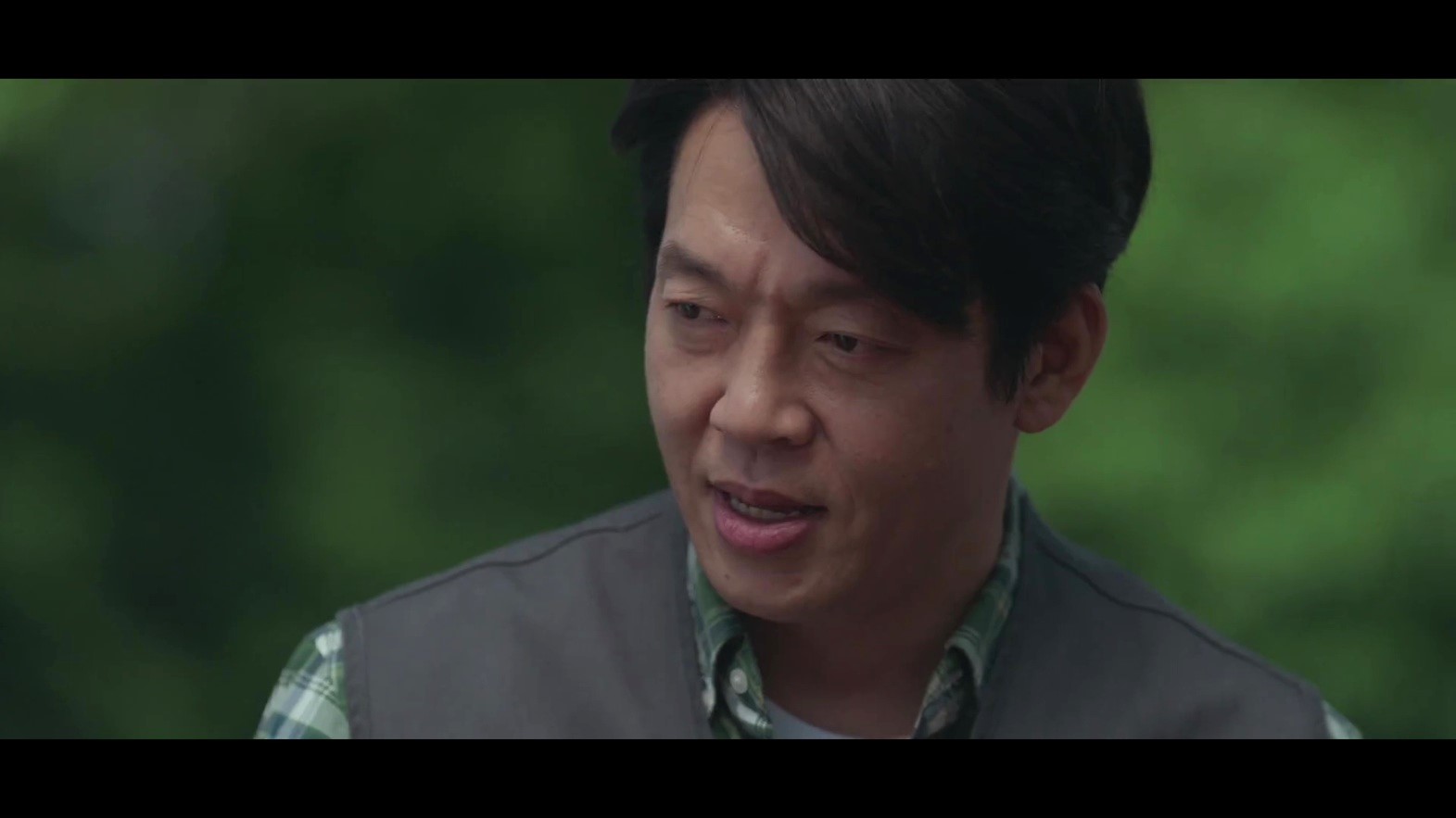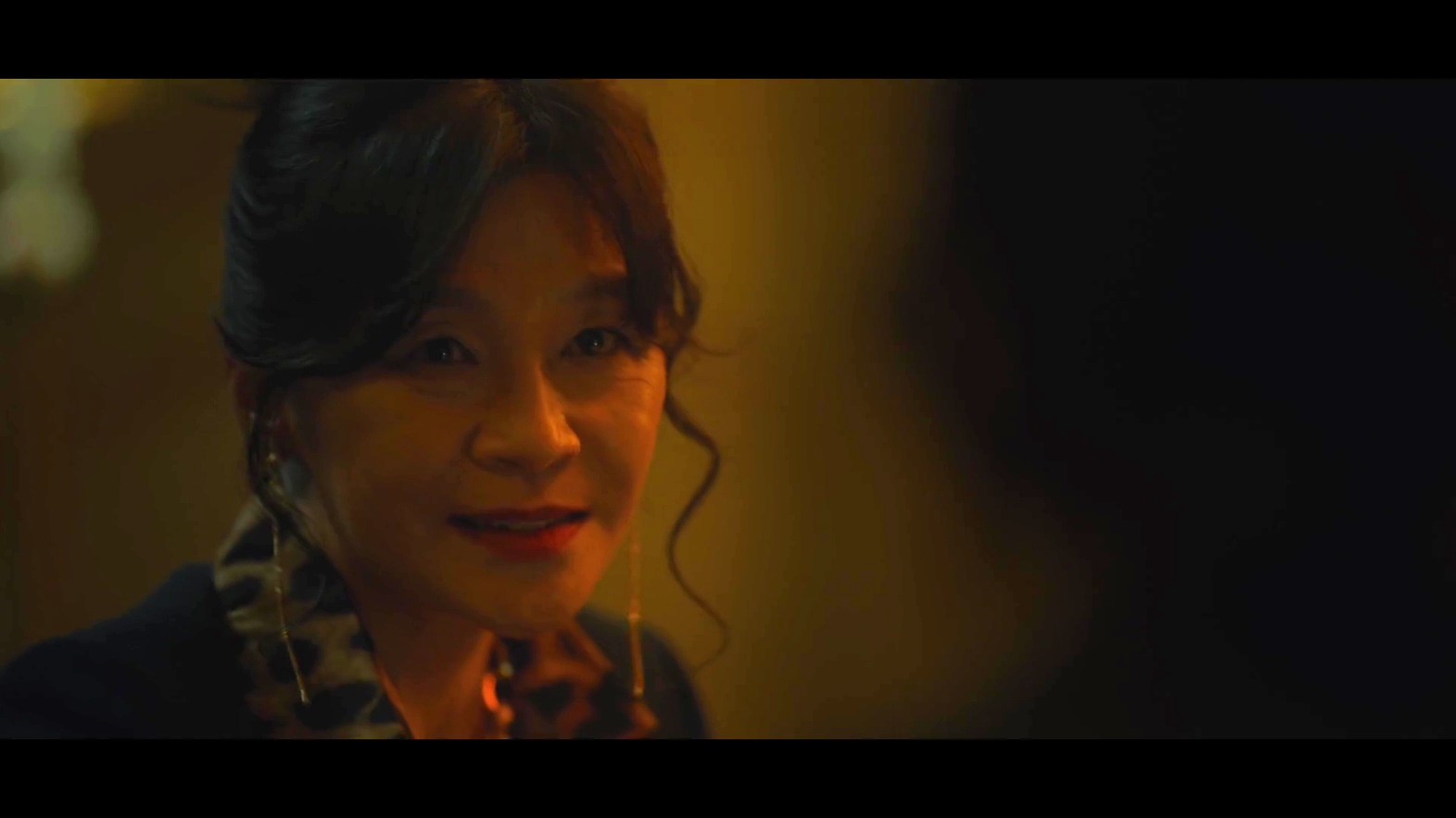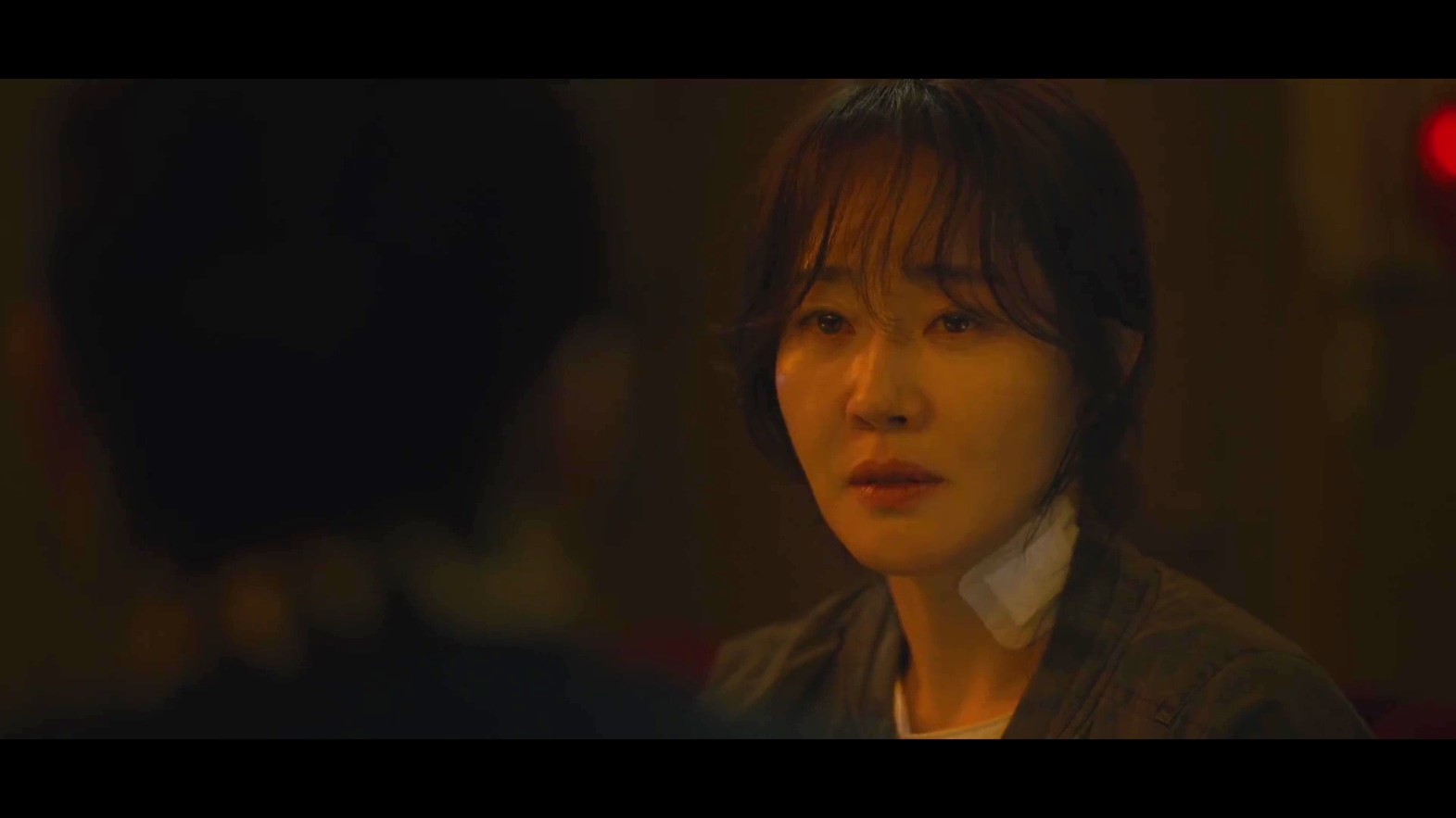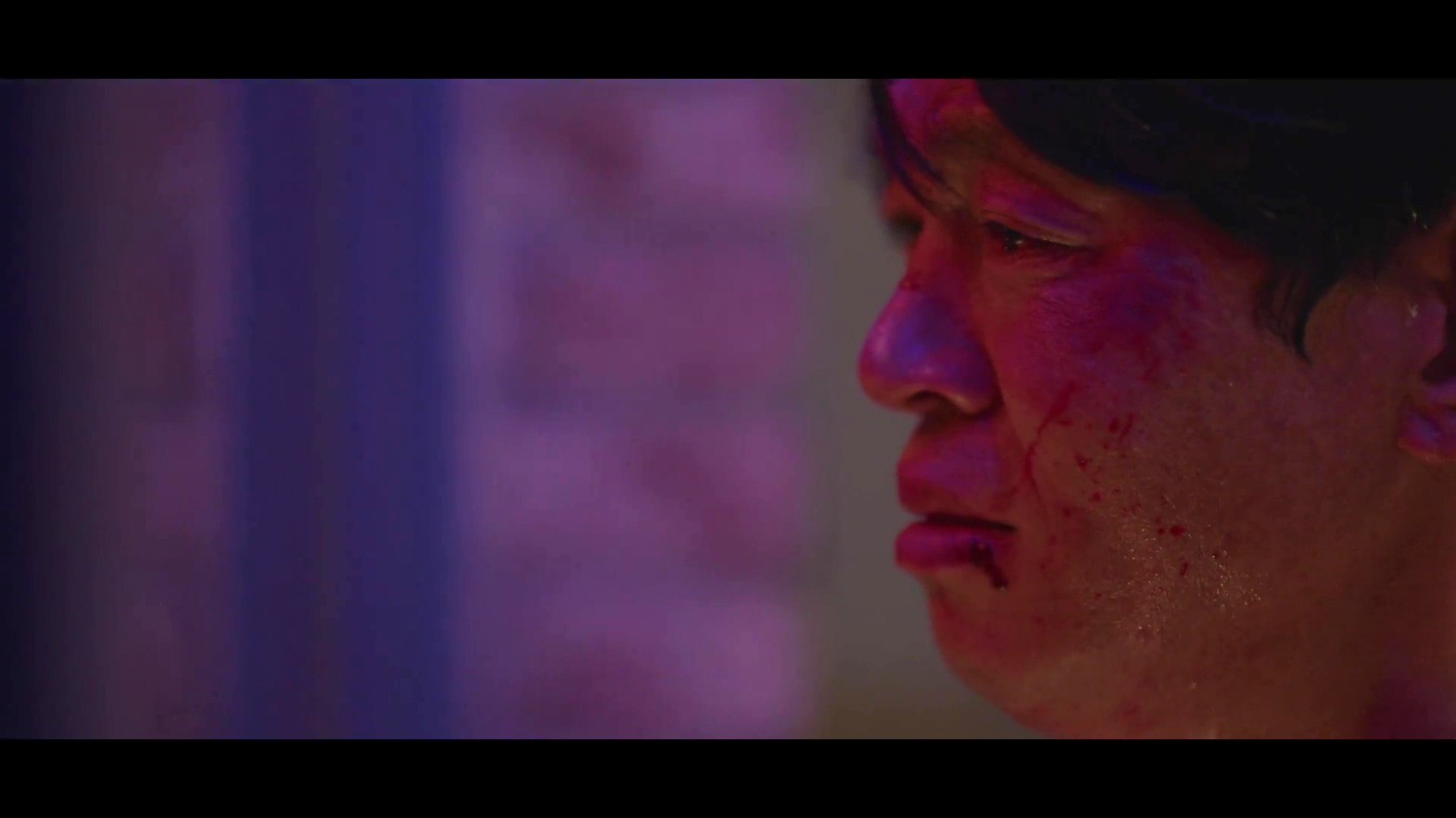[Drama special review] Summer Cold
by alathe

Our heroine’s world is ugly, isolated, and confined — until, quite without intending to, she’s reminded of what it’s like to love. The O’PENing showcase series continues to knock it out of the park with this moody, rain-drenched melo!
DRAMA SPECIAL REVIEW

From morning to joyless night, our heroine, CHA IN-JOO (Eom Ji-won), trudges through life. Every day, face wiped clean of emotion, she moves like a ghost down the streets. She works as a nebulously-legal enforcer for the moneylender who took her in as a child, JANG SUNG-JA (Gil Hae-yeon). In contrast to In-joo, who dresses unobtrusively and threatens debtors like it’s a chore, Sung-ja is a swaggering, sushi-guzzling crime boss with a flair for theatrical stabbings. In-joo is treated with fierce hostility. Still grieving the decades-old loss of her twelve-year-old daughter, Sung-ja views In-joo as a hollow replacement — that is, when she allows her any independent identity at all. In-joo’s family history is a litany of violence; her current life, a queasy mixture of boredom, threats, and loneliness.
Still, there’s one bright spot in In-joo’s otherwise featureless day to day. Namely, the man who lives opposite her grimy flat, KANG JIN-DO (Park Ji-hwan). He’s a friendly middle-aged widower, with a daughter he adores, and a planet-sized crush on his prickly neighbor. He sticks out like a sore thumb in In-joo’s grim, noir-tinged world. Her job routinely involves ruining people’s lives; he, meanwhile, fixes things for a living. And yet, he’d follow her into hell and back. One of the most gorgeous sequences in this episode involves him treading after In-joo in the rain, silently matching her footsteps while she moves through the streets — refusing to talk, but still letting him stay near.


Little by little, through a mixture of drunken karaoke and apple-related mishaps, Jin-do tiptoes his way into In-joo’s life. He becomes a cleaner at her friend’s karaoke bar. He leaves an umbrella by her doorstep when it’s raining. He even breathes hope into her awful apartment, fixing the curtains, painting the walls, and utterly transforming the boxed-in corners of her existence. Meanwhile, In-joo is silently yet profoundly enthralled. Every time life gets ugly, she finds herself meeting his eyes across the street. Awkward and hesitant at first, she starts letting down her guard. Some days, they even manage to exchange several sentences in a row!
Inevitably, there are complications. Sung-ja is far too possessive — and far too bitter — to relinquish her grasp on In-joo. The instant it looks like her wayward not-daughter might break free of the business, she looks for ways to reel her back in. And there’s obvious bait dangling right in front of her: Jin-do’s own disaster-prone daughter, KANG HA-YEON (So Ah-rin), who is mired in debt. Meanwhile, Sung-ja’s disgruntled subordinate, JJAGEUL (Cho Dong-in) stews resentfully in the background. All in all, In-joo’s old life is waiting to claim her.

This drama knows what it’s about in terms of aesthetic. There’s a gloomy, prison-like quality to the spaces In-joo inhabits. Most frequently, we find her lingering on thresholds: gazing through windows at dresses she’ll never let herself wear; meeting Jin-do’s eyes through broken panes of glass, closed doors, and crowded streets. She can watch and yearn, but she can’t bring herself to cross over. Eom Ji-won is an immensely subtle actress: here, she expertly portrays a woman trying to move through the world whilst making as little impact as possible.
All this brings glorious pathos to those moments where we see her curled up in her flat, alone and suffering from a cold. A summer cold, she reflects, is the most isolating of all illnesses: it feels like you’re the only one who’s sick. Still, just as frequently, we see Jin-do crossing or simply interacting with the barriers surrounding her: leaving her umbrella on the hook of her front door, repairing its hinges, inviting her inside his car. She, in turn, leaves messages for him in the window, and apples on his doorstep. This fascination with borders builds up to an absolutely gutting moment at the end, involving both a) doors, and b) more heartbreak than you ever thought possible.


One of the highlights of this episode, for me, were the scenes between In-joo and her surrogate mother, Sung-ja. This dysfunctional relationship has had decades to fester, but buried deep, there’s recognition, if not love. When they sit opposite one another in Sung-ja’s office, the room feels like its own moodily-lit, opulent kingdom in miniature — and In-joo, the only person within it that Sung-ja acknowledges as real. And yet, half the time, she calls her Ji-sun — the name of her long-lost daughter, whom she hates her for resembling. The instant In-joo expresses desires of her own, Sung-ja itches to crush them. This is why, for years, In-joo has parceled herself up into smaller and smaller pieces. It’s gory and compelling, and plays out beautifully in the final scenes.
Meanwhile, the burgeoning romance between In-joo and Jin-do was done so subtly, and so sweetly. I loved the montage of little kindnesses that Jin-do brings to her life, and those unguarded moments of hesitation that Eom Ji-won captures so perfectly. Park Ji-hwan is the polar opposite of suave here, and I love him for it: he and his awkwardness are a delight. Moreover, his character wields an excellent metaphor. Memorably, Jin-do compares trauma to an egg yolk held within you. By implication, in order to share your experience with someone, you have to let yourself break a little. Still, when it comes down to it, in Summer Cold, love is symbolized by mending things.


A similar idea is expressed when Jin-do gives In-joo a marigold plant. It’s a beautiful flower, but the best thing about it, Jin-do insists, is that it’s useful when it dies, too. The dried-up petals can be used to make tea. Love, it seems, is never really gone for good — endings can be nourishing too. Later, In-joo learns that the marigold symbolizes eternal happiness, but also, more ominously, a storm ahead. This, she decides, is no contradiction. Happiness lies in holding hands and comforting one another when things are hard. There’s no fixing things without breaking them first, and no comfort without hardship.
This episode demands close attention, and for the most part, I was on board. I’ll admit, though, I lost a little patience with the ending. Emotionally speaking, the beats were all in place. Still, I could have used a little more practical explanation for why things turned out the way they did; as is, characters made the choices the story required them to make. Maybe I’m not quite cut out for wallowing in angst for angst’s sake — and, boy, is this is a story that wallows! Still, overall, this episode is really nicely done: it’s thoughtful, intricate, and luxuriously subtle. Is it slow-paced? Absolutely. But if you accept this and let yourself be pulled along by its current, the experience is so very worthwhile.

RELATED POSTS
- [Drama special review] Summer, Love Machine Blues
- [Drama special review] Perfect Shot
- [Drama special review] A Walk
- [Drama special review] 2:15 PM
- TVING x tvN’s O’PENing series drops posters and airdates
- tvN x TVING unveils their lineup for O’PENing 2023
- [Drama special review] Like Otters
- [Drama special review] Stain
Tags: Drama Special, Eom Ji-won, Gil Hae-yeon, Park Ji-hwan

![[Beanie Recs] Feel-good fantasy?](https://d263ao8qih4miy.cloudfront.net/wp-content/uploads/2022/05/BeanieRecs.jpg)


![[Beanie Review] A Virtuous Business](https://d263ao8qih4miy.cloudfront.net/wp-content/uploads/2024/10/AVirtuousBusiness_reviewb.jpg)





Required fields are marked *
Your email address will not be published. Required fields are marked *
1 jerrykuvira
September 18, 2023 at 8:50 AM
Between Summer Cold and One Reason We Can't Meet, I don't know which of the drama specials scores the top in my score sheet.
Its world as you said Alathe is cold and gripping. I really didn't understand why In-joo made that choice in the ending. But after wallowing in thinking more about it, I guess she did it for his sake. She didn't want him having a share in the repercussions of the events that happened that day at the karaoke bar. Did it make sense? Yes, it finally did. Did I finally accept it? Yes, after much brooding. Did I agree with it? No. Why? Because In-joo deserves moments of joy, not just little snippets here and there but a continuous one. I'd gladly accept any unrealistic plotline thrown in as long as it'd keep In-joo out of jail. And if that couldn't be, perhaps a sentence like her namesake In-joo in Little Women got - one year and half jail time and two years probation.
And, I was really shocked to see how Park Ji-hwan was styled here. Our Blues (My first intro to him) made a very unattractive first picture of him to me. This is another drama giving me a shock an good actor can look on another drama set.
Thank you Alathe for the recap of Summer Cold.
Required fields are marked *
2 Lostpanda is celebrating My Ajusshi 💔
September 18, 2023 at 9:39 AM
@alathe The writing for this review is stunningly great. Hats off to you alathe.
Required fields are marked *
3 Chubbysocks
September 19, 2023 at 11:45 AM
Everyone finds love according to dramas, I wonder when I will be reminded what it’s like to love 👀
Required fields are marked *